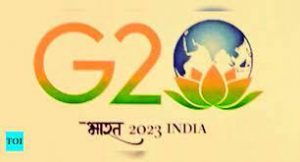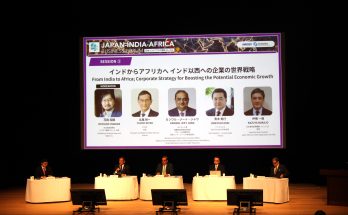
By Prof Anil Sooklal
South Africa’s Amb at Large BRICS and ASIA
India assumes the G20 Presidency at a very challenging period in modern human history.Not since the end of the cold war has the world been so fractured and polarized as a result of several simultaneous challenges. Thomas Friedman has described the current era as the ‘Age of Acceleration.’ A number of global issues are cascading on the human psyche all at the same time creating a dilemma on how to effectively address these challenges simultaneously. These include the advent of new technologies, climate change, biodiversity loss as well as globalisation. More recently the impact of the Covid pandemic as well as the Russia- Ukraine conflict have all collectively contributed to have a devastating impact on the global community.All of the above issues are receiving attention within the G20 Agenda. However, the impact of these challenges are felt most among the most vulnerable countries, especially the Least Developed (LDC’s) and Small Island Developing States (SIDS) as well as Africa. In Africa itself over 30 million people were pushed into extreme poverty in 2021 and about 22 million jobs were lost due to the Pandemic. Furthermore, the Russia-Ukraine conflict is expected to push a further 1.8 million Africans into extreme poverty in 2022 rising to over 2.3 million in The dire plight of developing countries in containing and addressing the severe impact of the Pandemic and the Conflict as well as the challenges posed by climate change must receive priority attention in the G20 Development Agenda under India’s Presidency. India as a developing country must prioritise the development agenda and ensure that it assumes center stage within the G20. The Global South will look to India to ensure that issues of development that are critical in advancing their development including meeting the UN.Sustainable Development Goals (SDG’s) receives priority attention in the G20 in 2023.
The Development Working Group (DWG) In 2010 the G20 leaders identified the need to establish the G20 DWG with a mandate to lead in the implementation of the group’s development agenda. At the Seoul Summit in November 2010 G20 leaders adopted the multi-year action plan on Development and the Seoul Development Consensus for Shared Growth. These two documents guide the work of the DWG. South Africa serves as a permanent co-chair of the DWG since its inception. Since 2010 each successive Presidency of the G20 have placed specific development issues as the core focus of the DWG during its Presidency, whilst also following up on commitments already made. The Comprehensive Accountability Report released in 2013 for the first time served to inform on G20 Commitments annually, namely, an update of the G20. Action plan and an assessment of the progress on the development commitments undertaken by G20 leaders.
Africa and the G20 Development Agenda How has Africa benefited from the G20’s programs and commitments in addressing its developmental challenges? South Africa is the only African country that is a G20 member. The Chair of the African Union (AU) and the Chair of the African Unions Development Agency- New Partnership for Africa’s Development (AUDA – NEPAD) both serve on the G20 as observers. Within the G20 South Africa has consistently advocated for the advancement of the AU’s Agenda 2063.Since its inception, the DWG has become an important instrument in addressing the most critical development challenges of the global South, including Africa. DWG programs over the years have focused on a whole range of development issues including human resource development, women’s economic empowerment, climate action, infrastructure, green energy, food security, industrialization, digitalization, trade, private investments as well as job creation. The 2012 progress report of the DWG notes that the G20 must serve as a relevant coordination forum for international economic cooperation. Effective contributions by international organisations and G20 countries, support by concerted actions of G20 members are fundamental to support national efforts of developing countries in overcoming hunger and poverty and promoting sustainable development. Following the repeated calls by South Africa as well the Chairs of the AU and the AUDA-NEPAD for Africa’s development agenda to receive support from the G20, there emerged an Africa specific program in the DWG under the Chinese and German Presidencies of the G20 respectively in 2016 and 2017.
The G20 Leaders Summit in Hangzhou, China in September in 2016 launched the G20 initiative on supporting Industrialization in Africa and Least Developed Countries. This initiative was welcomed by African countries as it addressed a critical gap in Africa’s economic regeneration. Although this was a voluntary initiative that has had limited direct impact in addressing Africa’s industrialization, it nonetheless brough sharp focus on the need of the global community to partner in Africa’s Industrialization. The Hangzhou Leaders Summit notes “We launched the G20 initiative on supporting industrialization in Africa and LDC’s to strengthen their inclusive growth and development potential through voluntary actions.” To date not much has been achieved in advancing Africa’s industrialization through the G20 Hangzhou commitment given that it relies on voluntary actions. An equally important initiative meant to advance Africa’s development was launched during the German presidency of the G20, namely the Compact with Africa (CwA). The Compact was initiated to promote private investments in Africa including in infrastructure. The CwA’s primary objective is to increase the attractiveness of private investments through substantial improvements of the macro business and financing frameworks. It seeks to bring together reform minded African countries, international organisations and bilateral partners from the G20 and beyond to coordinate country specific reform agenda’s, support respective policy measures and advertise investment opportunities to the private sector. The initiative is demand driven and open to all African countries. To date only 12 African countries are party to the CwA. The question arises as to why so few
African countries have become part of the CwA given the benefits it professes to accrue to CwA members? According to the CwA 2022 monitoring report, the outlook for CwA countries is relatively better than global and regional projections. As a group CwA countries are expected to continue to grow despite headwinds coming from the conflict in Ukraine,potential scarring from the ongoing pandemic, and the intensification of the food and fuel shock that is already underway.Its obvious that most African countries are reluctant to join the CwA which despite being launched some five years ago has had very limited impact in addressing the continents investment needs. Part of the challenge pertains to the so called country specific reform agenda of the CwA which is seen by African countries as an intrusive mechanism.
- India’s Presidency and the G20 Development Agenda India and Africa have a shared history spanning several centuries of robust economic, trade,cultural and people to people exchanges. In more recent times, India was one of the Chief Architects of the first Asia-Africa Conference held in Bandung, Indonesia in April 1955. It was at Bandung that the foundations of South-South Solidarity and Cooperation was firmly laid.Since its independence in 1947, development diplomacy has become an integral part of India’s foreign policy. Over the years India has strengthened its historical ties with Africa through a network of bilateral, trilateral and multilateral engagements. The India Africa Forum Summit (IAFS) is now an established and important platform in advancing India Africa relations.Through its bilateral engagements with Africa, including the AU Commission in Addis Ababa as well as the IAFS, India has a vibrant and multifaceted development cooperation engagement with Africa, through Prime Minister Modi’s Ten-Point Plan that is aligned with the AU’s Agenda 2063. It is within this prism that one must view India’s G20 Presidency and its engagement with Africa. As a trusted time honored partner of Africa and a fellow developing country of the Global South there is an expectation that Africa’s development Agenda will be one of the priority focus areas of India’s Presidency. This sentiment was articulated by Amitabh Kant, India’s G20 Sherpa addressing the Kigali Global Dialogue held in Rwanda in August 2022. He noted that India will embed the concerns of the developing world at the heart of the G20 Agenda. He further stated that the development concerns of Africa must form the bedrock of the G20 consensus. He also highlighted that India and African nations collectively have the highest percentage of young population in the world. This demographic dividend needs to be leveraged responsibly so as to ensure that it achieves its highest potential.India’s commitment and solidarity with Africa was sharply demonstrated at the height of the Pandemic through its vaccine Maitri initiative. While most of the developed world were focused on ensuring vaccines for its own citizens which led to many of these countries being accused of vaccine nationalism and vaccine hoarding, India made available vaccines for free or at a marginal cost to the developing world including Africa. India’s theme for its G20 Presidency, Vasu Dhaiva Kutumbakam: One Earth, One Family,One Future resonates with the African concept of Ubuntu: I am because you are, to be human is to recognise the humanity of others. It is these twin concepts which places the wellbeing of humanity at its center that should underpin India Africa cooperation and partnership within the G20 and beyond. The priorities identified by India for its Presidency covers the key issues needing global attention and collaboration. These include issues which will also be transformational to Africa namely, health, agriculture, education, digitalization, climate financing, food security, disaster risk reduction and multilateral reforms.
- Conclusion
India’s Presidency of the G20 will be viewed as an important opportunity to ensure that development is brought back to the center of the G20 Agenda. Given India’s long-standing commitment in advancing the interests of the Global South in the international arena, India as an emerging global power is well placed in ensuring the core interests of the developing world, including Africa is mainstreamed during its Presidency. Africa will look to India to ensure that its socio-economic regeneration as articulated in Agenda 2063 receives the attention it warrants within the G20 under India’s stewardship. India’s G20 Presidency provides a strategic opportunity to reenergize and deepen the historic India Africa partnership underpinned by the joint desire to create a more inclusive and better world for all: One Earth, One Family, One Future.
Author Profile
- India Writes Network (www.indiawrites.org) is an emerging think tank and a media-publishing company focused on international affairs & the India Story. Centre for Global India Insights is the research arm of India Writes Network. To subscribe to India and the World, write to editor@indiawrites.org. A venture of TGII Media Private Limited, a leading media, publishing and consultancy company, IWN has carved a niche for balanced and exhaustive reporting and analysis of international affairs. Eminent personalities, politicians, diplomats, authors, strategy gurus and news-makers have contributed to India Writes Network, as also “India and the World,” a magazine focused on global affairs.
Latest entries
 DiplomacyJanuary 5, 2026India walks diplomatic tightrope over US operation in Venezuela
DiplomacyJanuary 5, 2026India walks diplomatic tightrope over US operation in Venezuela India and the WorldNovember 26, 2025G20@20: Africa’s Moment – The Once and Future World Order
India and the WorldNovember 26, 2025G20@20: Africa’s Moment – The Once and Future World Order DiplomacyOctober 4, 2025UNGA Resolution 2758 Must Not Be Distorted, One-China Principle Brooks No Challenge
DiplomacyOctober 4, 2025UNGA Resolution 2758 Must Not Be Distorted, One-China Principle Brooks No Challenge India and the WorldJuly 26, 2025MPs, diplomats laud Operation Sindoor, call for national unity to combat Pakistan-sponsored terror
India and the WorldJuly 26, 2025MPs, diplomats laud Operation Sindoor, call for national unity to combat Pakistan-sponsored terror







